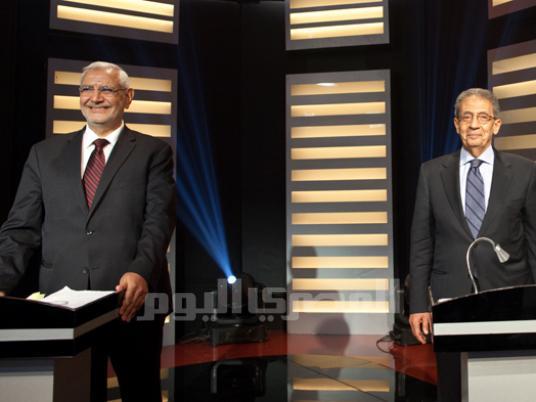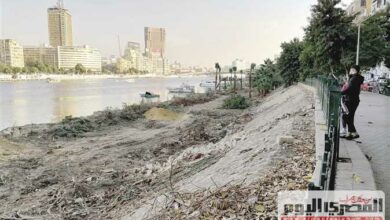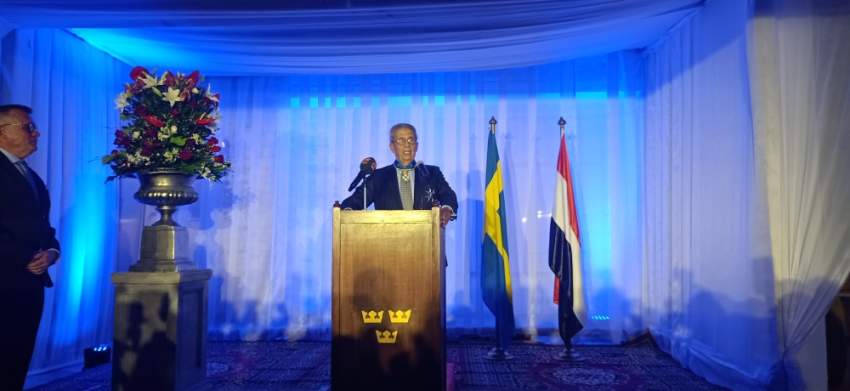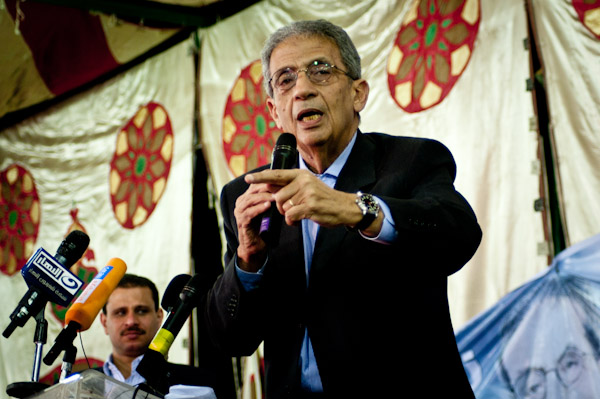
Egypt’s first ever presidential debate was worth the wait if your criterion was time, clocking in at four and a half hours long, and while the candidates were civil during most of the duration, by the end they were trading barbs.
Amr Moussa began the offensive, starting by questioning Abdel Moneim Abouel Fotouh’s position on Sharia law, and so it continued, with Moussa spending more than the rebuttal time attacking Abouel Fotouh, who was attempting to present himself as someone who has united people. In return, Abouel Fotouh repeatedly referred to Moussa’s history as part of the regime of toppled Hosni Mubarak.
Moussa reciprocated by bringing up Abouel Fotouh’s past with the Muslim Brotherhood and Jama'a al-Islamiya, to the point that he read excerpts from Abouel Fotouh's memoirs to push the point that he promoted violence in the past, a charge that that Abouel Fotouh vehemently denied.
Abouel Fotouh repeatedly attacked Moussa over his claim that he was an objector to the Mubarak regime, wryly pointing out that if that were so he himself must be the one who was a supporter while he languished in jail. He pointed out that Moussa once disclosed that he would vote for Mubarak as president again, an allegation that Moussa put in the context of the succession project, when the former president was grooming his son Gamal for the presidency. "I endorsed Mubarak as a better evil," he said.
Moussa pushed Abouel Fotouh on many issues, such as his allegiance to the Brotherhood, and insinuated that if he had support from such disparate political forces, from Salafis to liberals, he must be promising different people different things. “He is a Salafi with Salafis and a liberal with liberals,” Moussa contended.
The standout concession of the night came after Moussa prodded Abouel Fotouh into admitting that he intended to implement the rules of Sharia law, not just the principles as stated in Article 2 of the outgoing 1971 Constitution. Abouel Fotouh countered that implementing Sharia law did not in any way contradict principles of citizenship and equal rights, nor would it curtail freedoms of speech or expression.
The candidates tried to best each other in several topics, but Abouel Fotouh was successful in aligning himself to the revolution to the detriment of Moussa, who seemed removed from it as a result. The flipside was Moussa managing to paint Abouel Fotouh as someone who seems like all things to all people, saying reality would not allow for that.
The former foreign minister took a more entrenched view that the president should retain many powers, while his counterpart seemed more comfortable with a mixed system in which the president oversees foreign affairs, national security and coordination between the branches of power.
Both stressed judicial independence, and came out with strong rhetoric regarding the armed forces, but it was evident that neither would actually be willing to curb the military that much nor hold them accountable for anything. It seemed to be mere bombast, vague and ensconced in generalities. Moussa spoke of the military's economy as a self-sufficiency tactic and he repeatedly said "I will only speak of the armed forces" (as opposed to the Supreme Council of the Armed Forces). Abouel Fotouh briefly contended that no institution in a democratic state should be above the law, but in general no one could believe that either candidate had any intention of clipping the military's wings.
Both were playing to the gallery when it came to lower-income Egyptians, especially Moussa who drove that point through time and time again. What was interesting was that both were committed to the LE1,200 minimum wage stipulated by an administrative court ruling. Their economic plans were extremely similar to and very much in line with the cabinet of current Prime Minister Kamal al-Ganzouri. At times Abouel Fotouh was more specific, especially when talking about progressive taxation, subsidies policies, healthcare and education.
Some watching will claim that Abouel Fotouh was the “weaker” one because he wasn’t laying into Moussa as much as the latter was laying into him, but that would be inaccurate. The former Brotherhood member bases a large part of his campaign on having a personality that unifies rather than divides.
This stood him in good stead in the stakes of presidential demeanor, with Moussa seeming the more irritable and erratic contender. One could spot a subtle smile that Abouel Fotouh wore during heated points of the debate. Moussa started nervously but quickly gained composure and stature, while Abouel Fotouh seemed unruffled from the start.
Moussa had Abouel Fotouh’s number in other presidential matters, paying more attention to how a president should conduct himself in office, while his counterpart preferred to present himself as a humble servant of the people.
In the end, supporters of both candidates will say that their man came out on top, which probably means that it was a tie, with each candidate making gains in different arenas — which is what we knew already anyway. Less resolved voters saw that Moussa didn't particularly add discourse to attract people, while Abouel Fotouh definitely alienated swing voters.
Besides the seemingly big business of ads surrounding the televised show, the first presidential debate in Egyptian history did nothing more than affirm people’s ideas of the two candidates and where they lie on the spectrum of ideology and politics.




